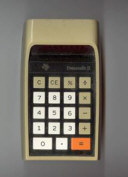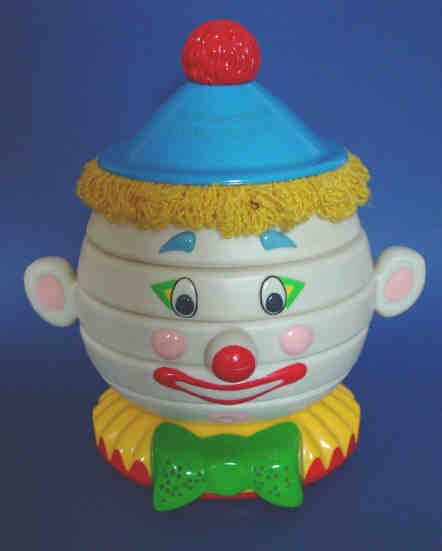
DATAMATH CALCULATOR MUSEUM
 |
DATAMATH CALCULATOR MUSEUM |
Texas Instruments Magic Clown
| Date of introduction: | 1991 | Display technology: | |
| New price: | Display size: | n.a. | |
| Size: | 10.8" x 9.0" x 7.5" | ||
| Weight: | 17 ounces | Serial No: | |
| Batteries: | 4*AA cells | Date of manufacture: | mth 06 year 1993 |
| AC-Adapter: | Origin of manufacture: | China (A) | |
| Precision: | Integrated circuits: | TSP50C11/CSM11124 | |
| Memories: | |||
| Program steps: | Courtesy of: | Joerg Woerner |
 The
Magic Clown introduced in 1991 with a German voice is identical to Stack-A-Round
Clown, the first stacking toy that talks. In France the toy was sold as Le
Clown Magique and in United Kingdom as Chatter-Ring Clown.
The
Magic Clown introduced in 1991 with a German voice is identical to Stack-A-Round
Clown, the first stacking toy that talks. In France the toy was sold as Le
Clown Magique and in United Kingdom as Chatter-Ring Clown.
Five colorful rings, each representing a facial feature make up "Clarance the Clown's" face. Clarance recognizes each ring as it is placed on, or removed from, the stacking post. His friendly voice gives the name of the feature and explains the purpose of each part with a clever rhyme. Rings can be stacked in any order, allowing the child to create over 1000 faces.
Dismantling this Magic Clown manufactured in June 1993 by (or for) Texas Instruments in China for the German speaking market reveals a technology very similar to the various Touch & Talkies. The design of the Magic Melody Tell is centered around a TSP50C11 Voice Synthesis Processor (VSP) and makes use of just one Integrated Circuit:
| • TSP50C11/CSM11124: TSP50C50 VSP (Voice Synthesis Processor) with 8-bit microcontroller and 16k Bytes Mask ROM for both program and voice and 128 Bytes + 16 Nibbles RAM |
The toy is intended for toddlers ages 12 to 36 month.
The integrated speech synthesizer introduced more than 10 years ago with the Speak & Spell will immediately create funny sounds.
Other toys for toddlers are the Discovery Depot, Listen & Learn, Magic Sorter, My Own Playphone, Peek-A-Boo Zoo and Storytime Sorter.
If you have additions to the above article please email: joerg@datamath.org.
© Joerg Woerner, September 28, 2002. No reprints without written permission.